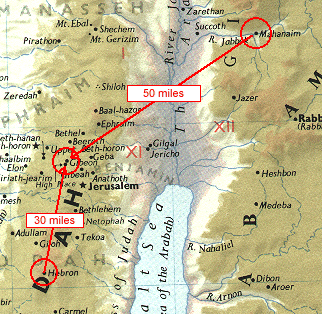|
 |
July
18
|
 |
|
|
|
Reading
1 - 2Samuel 2
Click
here to Listen
|
|
v.11-13
- A map shows the amount of planning this took. It is always worth reminding
ourselves of the distances involved:

Peter Cresswell
|
|
v.3
- This is the first indication I have noticed - there may well have been
others that I have missed - that the 600 men that travelled everywhere with
David also had their wives and families with them.
Peter Cresswell |
|
v.1
- In that David enquired where he should 'go
up' we know that at this stage he did not know where his capital was
to be. Jebus was still under the control of the inhabitants of the land
- over 500 years after the nation entered the land under Joshua.
Peter Forbes |
|
2:8-17
Abner was Saul's uncle (1
Samuel 14:50)
Joab was David's uncle - he was the son of Zeruiah, David's sister (1
Chronicles 2:15-16)
So we
see family rivalry in the way that Abner took Ishbosheth to be king. This
family rivalry is seen throughout the life of David, even after he is
king in Jerusalem.
Peter Forbes
|
|
:5
We see a characteristic of David - his kindness and thoughtfulness - in
that he sent to the men of Jabesh Gilead. We will notice other similar kindnesses
throughout David's life. This is one of the characteristics of a man of
God. The kindnesses done were not strictly necessary - but were truly acts
of compassion.
Peter Forbes |
|
|
Reading
2 - Jeremiah 8
Click
here to Listen
|
v.5
- It is quite obvious that Israel were a constant disappointment to God
[ch.2:32,
3:11-14, 7:24-26
etc.]. We tend to think we are different, but is this not a presumptuous
thought? Let us make sure that we learn from their mistakes and not fall
into the same condemnation. 1Thes.5:21,
2Thes.2:9-12, Rev.2:25.
Peter Cresswell |
|
v.3
- Another of the constant reminders that the words of God present to us
decisions which are no less than life or death.
Peter Cresswell |
|
v.11
- There were those in Jerusalem at the time of Jeremiah who were countering
his words of judgement by saying that the woes that he was predicting would
not come - hence 'peace, peace'. However the judgements did come. But spare
a thought for Jeremiah who was speaking what was viewed as treason against
the house of God.
Peter Forbes |
|
8:10
The threat to 'give their wives unto others' quotes Deuteronomy
28:30 and as such Israel should have known that they were astray from
His word - they were experiencing the curses that would flow upon those
who were disobedient.
Peter Forbes |
|
:13
Jeremiah's assurance that his words 'shall not pass away' is the basis of
Jesus' assurance about his words (Matthew
24:35 Mk 13:31 Luke 21:33)
Peter Forbes |
|
|
Reading
3 - Matthew 19
Click
here to Listen
|
v.6
- If we weigh this statement carefully against the rest of scripture, it
is much more than a piece of moral advice about practical living. It refers
to our relationship with the Lord, our covenant relationship into which
we entered at baptism, which we cannot undo. Prov.2:17,
Mal.2:14, Mark 10:9.
Peter Cresswell |
|
v.6
- Notice it is God who does the joining. We might think of marriage as a
union between the man and woman at their agreement. However Jesus shows
that the actual joining is of God. This must be because marriage patterns
the relationship we have with Jesus - as his bride. That is of God. We are
called by him, not of ourselves. [1
Corinthians 6:20]
v.21
- We may have difficulties with the concept of being 5046
'perfect' Look at the way the word is used elsewhere in Scripture.
[Matthew
5:48 19:21 Romans 12:2 1 Corinthians 2:6 13:10 14:20 Ephesians 4:13 Philippians
3:15 Colossians 1:28 4:12 Hebrews 5:14 9:11 James 1:4,17,25 3:2 1 John 4:18]
Peter Forbes |
|
19:18
Notice 'thou shalt not covet' is omitted from the list of prohibitions that
Jesus quotes from the law of Moses - he knew the young man's problem though
the man did not know it himself.
Peter Forbes |
|
:30
In saying 'the first shall be last and the last first' Jesus introduces
a concept which he weaves into a parable.
Peter Forbes |
|
| There
are a few statements of Jesus, similar to v23-24,
in which he makes the point that it is difficult to inherit the kingdom
of God. Other examples are: Luke
14v25-27; 14v33. On the surface, these statements could make us feel
very inadequate, and quite afraid of rejection. But was Jesus meaning what
we think he meant?
Jesus
gives his game away in this chapter in Matthew. He wasn’t actually
saying that it was difficult to enter the kingdom of God, but impossible!
It is IMPOSSIBLE for a camel to go through the eye of a needle! (v26)
This is extremely important, because it makes us wonder, as the disciples
did, “who then can be saved?” (v25).
The answer of Jesus is “with men this is impossible; but with God
all things are possible”.
It was
impossible for the rich man to enter the kingdom of God. His question
to Jesus had been “what must I do to INHERIT the kingdom of God?”.
He believed that one might inherit it, or earn it, through ones good works.
This man’s good works were very good, and Jesus loved him for it
(Mark
10v21), but his trust in his own works was misguided (James
2v10). He needed, just like us, to benefit from the free and un-earnable
salvation that Jesus was about to bring into being through his sacrifice.
This is what Jesus meant by “with God all things are possible”.
Robin
de Jongh
|
|
